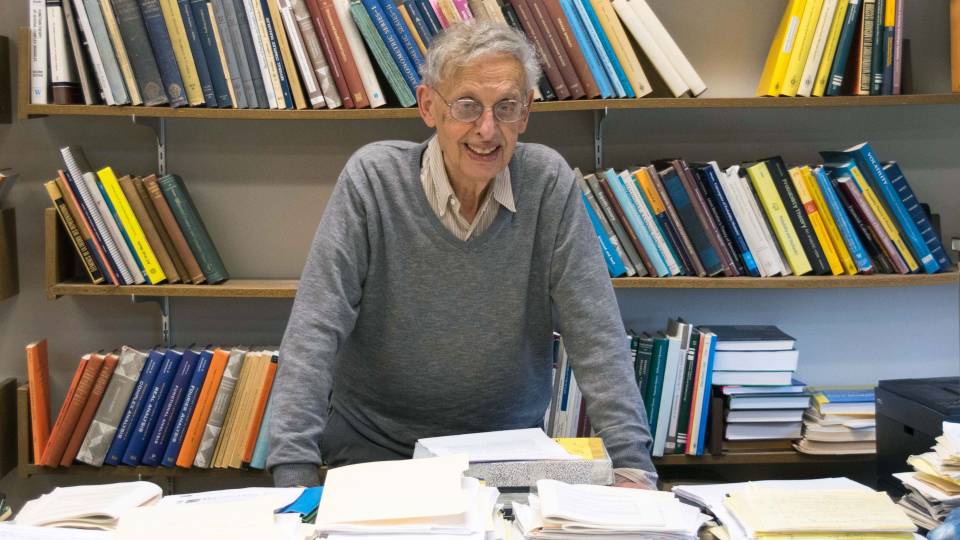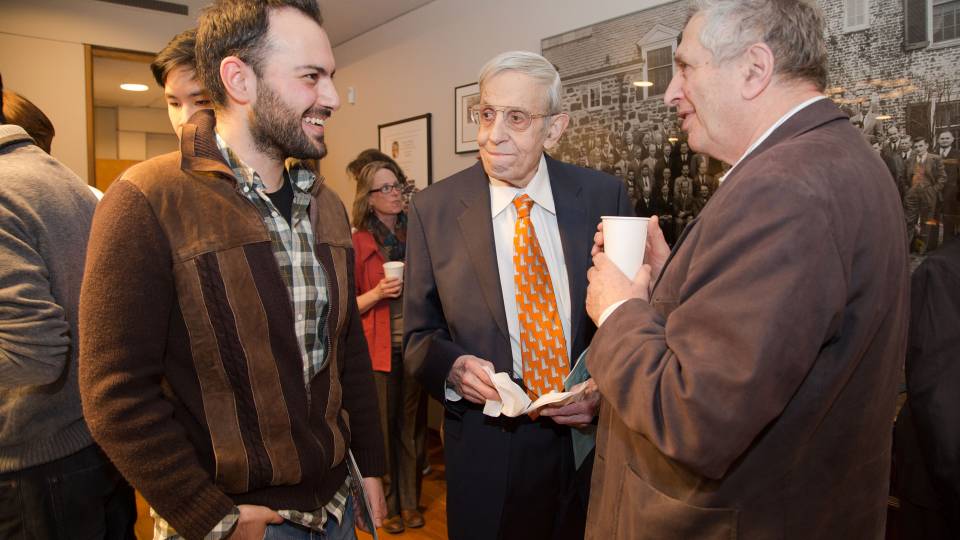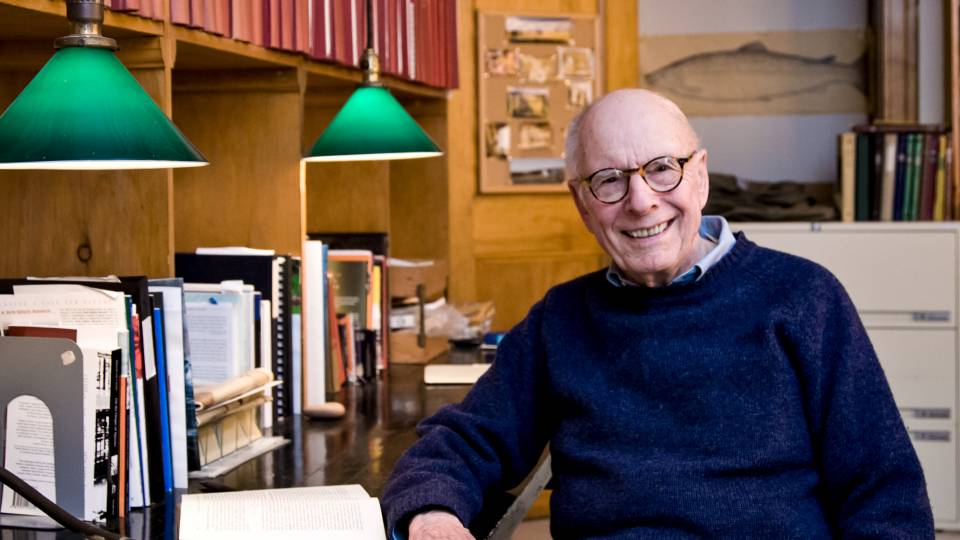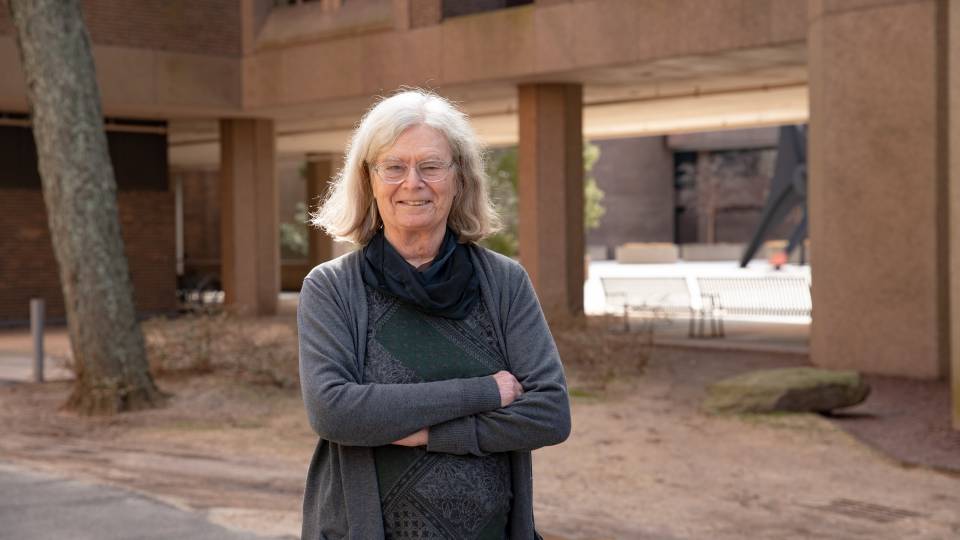Joseph John Kohn, professor of mathematics, emeritus, a 1956 Ph.D. alumnus and a leader in the field of several complex variables, died on Sept. 13. He was 91.
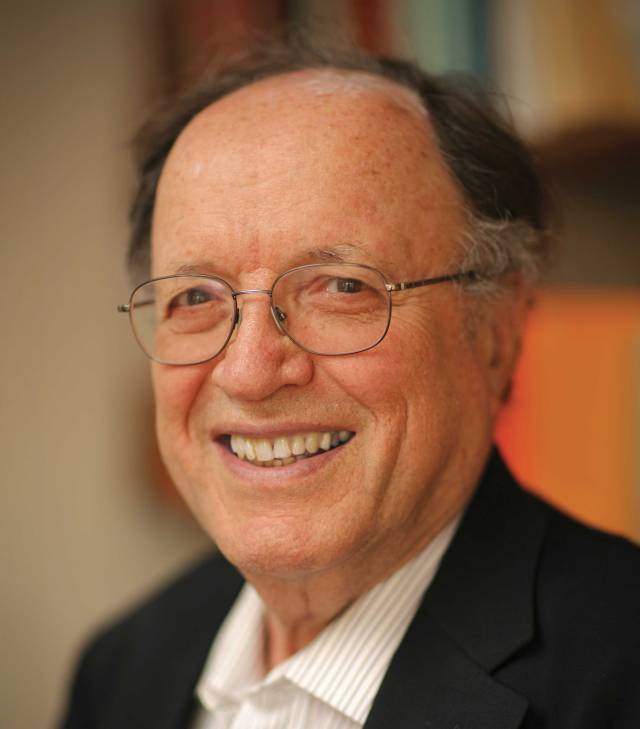
Joseph Kohn
Born in Prague in May 1932, Kohn emigrated to Ecuador in 1939 before moving to New York City in 1945. After graduating from Brooklyn Technical High School and the Massachusetts Institute of Technology, Kohn came to Princeton in 1954 for graduate school, then joined Princeton’s faculty as an instructor for one year. He was a professor at Brandeis University for nearly a decade, then returned to Princeton as a full professor in 1968. He taught at Princeton for 40 years, with a few years away as visiting faculty around the globe. He held the Henry Burchard Fine research chair from 2002 to 2003, and he transferred to emeritus status in 2008.
“Joe was among the most friendly, popular and influential mathematicians of his generation,” said John D’Angelo, a 1976 Ph.D. graduate and an emeritus math professor at the University of Illinois Urbana-Champaign. “His mathematical legacy is enormous. I talked with Joe many times in the last six months. He remained engaged with mathematics until the end.”
Charles Fefferman, Princeton’s Herbert E. Jones, Jr. '43 University Professor of Mathematics, worked with Kohn for decades, including collaborating on several papers.
“Joe was very influential and original,” Fefferman said. “He was very focused on a very, very fundamental problem in mathematics. He and his grad students — whom he mentored and nurtured very well — made great progress. The ideas that they came up with were used not only on that problem and related problems, but also on seemingly completely unrelated subjects.”
Kohn also spoke many languages fluently, which served him well at the many institutions and conferences he visited throughout his career. He was a visiting professor at Harvard University, the University of Mexico, the University of Buenos Aires, the University of Florence, the Institut des Hautes Études Scientifiques in Paris, and the Charles University in Prague. He was also a visiting scholar at the Institute for Advanced Study four times over his career, as a postdoctoral researcher in 1957-58 and 1961-62, then during his 1976-77 and 1988-89 sabbatical years.
In addition to his accomplishments in mathematics, Kohn was a standout department chair, first at Brandeis (1963 to 1966) and then during several terms at Princeton, where he advocated most effectively for bringing in great mathematicians and receiving increased funding for the department, as well as being an advisor to colleagues and students alike. Kohn led the math department from 1973 to 1976 and from 1993 to 1996, plus he served as acting chair in spring 2002.
“He was an extremely effective chairman,” said Fefferman. “Most of the senior faculty take one turn as chair, but it's rare to do more than one. I think people recognized that Joe had a very great talent for this. …. It’s fair to say that Princeton has the best math program in the country. Not ‘one of the best,’ the best. Joe brought in very, very strong people. This sounds self-serving — he brought me in — but aside from me, he did magnificent hiring. He brought in Bill Thurston, who was one of the great mathematicians of the century. He also played a role in retaining hires. He was just very good in all aspects of that.”
Ngaiming Mok, who is now the Edmund and Peggy Tse Professor in Mathematics at the University of Hong Kong, was on the Princeton faculty with Kohn from 1980 to 1985.
“Besides being inspired by his tremendous leadership in the field of several complex variables, I have much benefited from Joe Kohn’s openness and friendliness to junior researchers of different cultural backgrounds. This made me feel much more at home during my years in Princeton,” he said. “We have lost an elder statesman of our field and a dear friend.”
Kohn’s groundbreaking work dominated his field for more than half a century. He mentored 16 Ph.D. students, plus postdoctoral scholars and junior faculty members. Many recalled what a significant role he played in their lives and careers.
“He was a truly great mathematician whose contributions drastically changed the landscape of the field,” said Yum-Tong Siu, a 1966 Ph.D. graduate who is now the William Elwood Byerly Professor of Mathematics at Harvard University. “In the last five decades, his work has been playing such an indispensable role in the research of a whole generation of mathematicians in his field. To younger researchers, he was most inspiring, supportive and generous. He was always the person to turn to for advice mathematically, professionally and personally. We will all sorely miss him.”
“Joe Kohn was a giant in the field of analysis of several complex variables,” said Andreea Nicoara, a 2002 Ph.D. student of Kohn’s who is now the Accenture Associate Professor in Mathematics at the University of Dublin. “For the Princeton math department, he was a very important figure not just professionally but socially. Joe had a very sharp wit and warm personality. He always attended tea, so even graduate students working in different fields of math got to know him. He and his wife Anna Rosa entertained a lot and were very caring whenever someone needed help. My grandfather was killed while I was doing my Ph.D. at Princeton with Joe, and he and Anna Rosa helped me get through that difficult time.”
She continued: “One day in my third year, I showed up at my weekly meeting with Joe and told him that I couldn’t get anything done because I had sprained some fingers on my writing hand. Joe’s eyes twinkled, and he said, ‘You sprained your hand, not your brain, right?’ I then discovered that I didn’t need paper, so I did much of the work on my thesis walking along the canal. Joe worked in this way as well; he would walk around slowly for a while and then come back and scribble a few things down. Although counterintuitive, it is a better way of doing mathematics because one sees the big picture this way and does not get bogged down in details.”
Gerald Folland, a 1976 Ph.D. graduate, the author of several math textbooks, and an emeritus professor at the University of Washington, said, “I owe Joe Kohn a lot. I was his first Ph.D. student at Princeton, and the research problem he proposed was a perfect fit for me. Then he took me on as a collaborator to write up his 1970-71 lectures and turn them into a book, which launched me on another important aspect of my career.
“He wasn't afraid to tackle hard mathematical problems, and he had the patience and persistence to keep working on them until he got good results. Joe's mathematical work was almost all in an area that lies at the intersection of complex analysis in several variables and partial differential equations. He was a leading world expert in that specialized area, and some of the techniques he helped develop have much broader applications.”
“Meeting Joe was one of the luckiest things in my life,” said Charles Epstein, a former Princeton postdoctoral researcher who is now a senior research scientist at the Flatiron Institute’s Center for Computational Mathematics and the Thomas A. Scott Professor Emeritus at the University of Pennsylvania.
“When I arrived in Princeton as a postdoc, I knew nothing whatsoever about several complex variables, and was at a loss for what I should do,” Epstein said. “Joe sensed that I was floundering and took it upon himself to help me to enjoy my time at Princeton and find a direction for my work. He asked me to run the departmental colloquium and often took me to lunch at the IAS or Faculty Club, during which time we discussed mathematics and a great many other things. As a consequence of Joe’s kindness and the presence of a terrific group of postdocs working with Joe in severall complex variables, I also ended up working in this field.”
Among his many honors, Kohn won a Guggenheim Fellowship in 1976, the Leroy P. Steele Prize of the American Mathematical Society (AMS) in 1979, the Balzano Medal from the Czechoslovak Mathematics and Physics Society in 1990, and the Stefan Bergman Prize for Influential Research from the AMS in 2004. He was elected to the American Academy of Arts and Sciences in 1966 and to the National Academy of Science in 1988.
He served as editor or on the editorial boards of Advances in Mathematics, the Annals of Mathematics, the Journal of Differential Geometry, and the Transactions of the American Mathematical Society. He served as a member of the Board of Trustees of the American Mathematical Society and the Board of the Mathematical Sciences of the National Academy of Science.
He was a member of the first delegation of American scientists to visit China, in 1976, and he participated in scientific exchange programs with the USSR (1965) and Czechoslovakia (1967 and 1977). When the University of Bologna celebrated its 900th anniversary, they awarded Kohn an honorary doctorate, calling him “one of the most eminent living mathematicians.”
Kohn is survived by his wife, Anna Rosa Di Capua, of Quito, Ecuador; their children, Eduardo, Emma, and Alicia; daughter-in-law Lisa Stevenson; and grandchildren Benjamin and Milo. Donations in memory of Joseph J. Kohn can be made to HIAS, the National Museum of Mathematics, and the Jewish Center of Princeton.
View or share comments on a memorial page intended to honor Kohn’s life and legacy.
